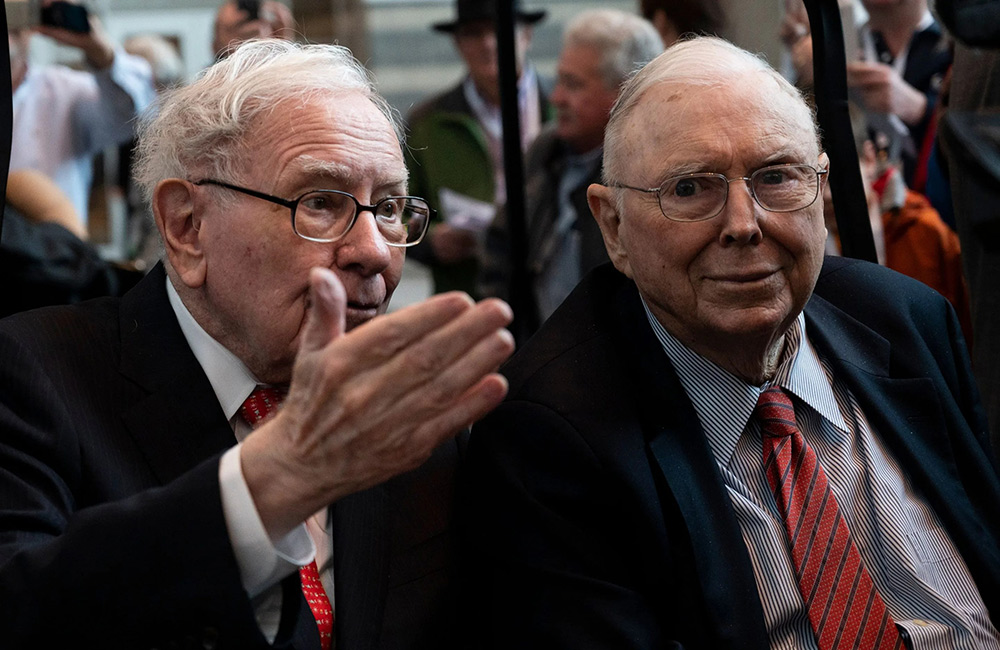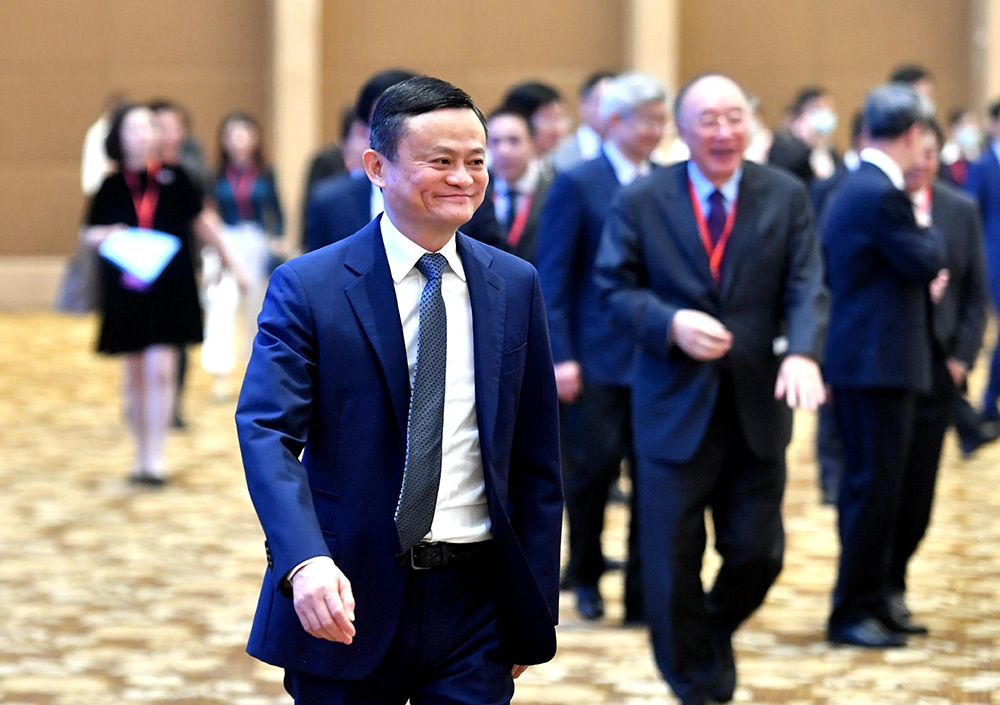查理·芒格是内布拉斯加州亿万富翁沃伦·巴菲特的长期投资伙伴。一年多以来他一直坚称,市场看空者对中国股票的看法大多有误,尤其是对一只中国股票,即电商巨头阿里巴巴的看法更是错误。
然而如今情况不一样了。过去三个月里某个时刻,华尔街向来最狂热看多阿里的芒格似乎改变了想法。
上周,总部位于洛杉矶的报纸和软件企业Daily Journal 公司在一份监管文件中披露,2022年一季度持有的阿里股份削减了约一半。而芒格正是掌管Daily Journal投资组合的管理者之一。Daily Journal 在文件中称,截至3月底持有阿里30万份美国存托凭证(ADR),低于去年年底持有的60.206万份。
文件显示,截至3月31日,Daily Journal持有阿里股份市值为3260万美元,低于12月31日的7150万美元。
现年98岁的芒格一直被称为巴菲特的“得力助手”,1977年以来一直担任伯克希尔·哈撒韦公司(Berkshire Hathaway)副董事长,担任Daily Journal董事长也长达45年。上个月,他辞去了Daily Journal董事长一职,但仍留在董事会。Daily Journal称,芒格会继续积极参与股票投资组合决策。

关于Daily Journal减持阿里一事,芒格拒绝置评。不过此举相较于2021四季度加倍增持阿里的行动可谓大扭转,也暗示了美国股神对中国公司前景看法突然转变。
全球其他投资者早在2020年10月就开始抛售阿里股票。当时亿万富翁,也是阿里联合创始人马云在上海出席了一场高端金融会议,发表了对金融行业的一些独特看法。
马云的发言引发关注和争议,阿里移动支付子公司蚂蚁集团350亿美元的首次公开募股也被叫停。马云随之逐渐淡出公众视野。监管机构对两家公司进行了突击检查,要求蚂蚁进行彻底重组,还对阿里处以数十亿美元的反垄断罚款。2022年3月12日,阿里在纽约证券交易所的股价从2020年10月27日317美元的新高下滑至87美元的接近历史低点,公司市值从8380亿美元的峰值缩水至2460亿美元,跌幅超过70%。
Daily Journal披露持股之前,芒格一直是公认阿里最坚定的支持者之一。2021年一季度,中国政府开始实施监管闪电战,重重打击了电商,网络游戏、在线教育、外卖和网约车等领域。与此同时Daily Journal决定买入16.5万份阿里存托凭证,阿里也就此称为该公司持股规模排名第三的公司。Daily Journal提交监管的文件显示,截至2021年3月31日,阿里股份占了公司投资组合的19%。
据Business Insider报道,芒格听取了喜马拉雅伙伴基金创始人兼董事长李录的建议,敦促Daily Journal投资阿里巴巴。李录曾说服巴菲特支持比亚迪。比亚迪是中国电池和汽车制造商,也是伯克希尔有史以来利润最高的投资之一。
2019年Daily Journal一次会议上,芒格透露已委托李录将部分个人财富投资阿里,还盛赞这位中国基金经理在全球最有希望的市场之一挑选赢家方面相当敏锐。“李录只是去了很容易钓鱼的地方,其他人只会在鳕鱼早被捉完的地方钓鱼,”芒格说。
对芒格来说,阿里是个不同寻常的投资选择,因为他经常指责存托凭证不透明而且复杂。此外,在2021年2月Daily Journal年度投资者会议上,芒格表示赞同中国政府对蚂蚁集团采取的政策,还直接批评马云针对中国监管机构的不当言论。

2021年6月接受美国消费者新闻与商业频道(CNBC)采访时,芒格赞成中国监管者让马云走回正路。“中国政府做得很对,”他说。“我不是希望移植中国所有系统,但我真希望美国金融系统也能如此。”
然而最近,芒格似乎一直在担心马云的傲慢,虽然中国市场长期增长前景看起来不可限量,最终得出的结论是做投资决策时威权制度影响力更大。“中国是现代化的大国,”2月 芒格在Daily Journal的2022年投资者大会上说。“过去30年里,中国拥有庞大的人口和大规模现代化。我们在中国做了些投资,因为从企业实力和安全价格方面投资中国能获得比在美国更多的价值。”
上个月,中国国务院副总理刘鹤承诺,采取一揽子措施支持经济和金融市场,这说明芒格的乐观似乎很有根据,甚至可能是先见之明。
但中国监管框架的变化仅部分兑现了承诺。刘鹤发表声明后的几周里,北京向少数中国网络游戏生产商颁发了新的版号,表示允许一些中国公司向美国证券监管机构提供更多查阅财务记录的渠道,防止美国监管机构迫使数百家中国公司从美国交易所退市。
尽管上海、广州和中国其他主要城市均爆发新冠疫情,急需在线服务,监管机构并未放松对阿里和其他大型数字零售商的限制。
蚂蚁对全公司进行了全面的业务改革,大幅增加了资本基础并提高了防火墙水平,还有将10亿用户的移动支付平台支付宝与财富管理和消费贷款等金融服务分开,然而上市之路仍前景不明。蚂蚁旗下货币市场基金余额宝管理的资产减少了三分之一以上。余额宝曾是全球最大的货币市场基金之一。2020年10月蚂蚁上市前夕,多位分析师对蚂蚁估值超过3000亿美元。种种新限制下,专家和投资者只能放弃原先评估。贝莱德(BlackRock)对蚂蚁的最新估值为1740亿美元,富达投资(Fidelity Investments)最近将其估值下调至780亿美元。
阿里最近的财务业绩也不会让芒格感到安慰。今年2月,该公司宣布季度收入同比增长10%,为2014年上市以来最低增速。
全球股市分析师仍然认为,阿里股价被严重低估。MarketWatch追踪的56位阿里分析师中。40人评级建议“买入”,6家评级为“增持”,只有一位分析师建议“卖出”。
然而,阿里面临监管困境和黯淡的财务业绩正考验基石投资者的决心,比如孙正义旗下的软银集团(SoftBank Group),软银持有阿里25%的股份。
阿里面临的更大威胁是,市场上出现了拼多多等灵活的电商竞争对手,而且中国消费者购物习惯不断改变,很多人从搜索并直接前往阿里的淘宝或天猫平台寻找产品,变成在与其他在线内容互动的同时被引导购物。
芒格向来以其睿智和简约的投资方法闻名。但在阿里案例中,他似乎发现钓鱼并不像看上去那样容易。(财富中文网)
译者:夏林
查理·芒格是内布拉斯加州亿万富翁沃伦·巴菲特的长期投资伙伴。一年多以来他一直坚称,市场看空者对中国股票的看法大多有误,尤其是对一只中国股票,即电商巨头阿里巴巴的看法更是错误。
然而如今情况不一样了。过去三个月里某个时刻,华尔街向来最狂热看多阿里的芒格似乎改变了想法。
上周,总部位于洛杉矶的报纸和软件企业Daily Journal 公司在一份监管文件中披露,2022年一季度持有的阿里股份削减了约一半。而芒格正是掌管Daily Journal投资组合的管理者之一。Daily Journal 在文件中称,截至3月底持有阿里30万份美国存托凭证(ADR),低于去年年底持有的60.206万份。
文件显示,截至3月31日,Daily Journal持有阿里股份市值为3260万美元,低于12月31日的7150万美元。
现年98岁的芒格一直被称为巴菲特的“得力助手”,1977年以来一直担任伯克希尔·哈撒韦公司(Berkshire Hathaway)副董事长,担任Daily Journal董事长也长达45年。上个月,他辞去了Daily Journal董事长一职,但仍留在董事会。Daily Journal称,芒格会继续积极参与股票投资组合决策。
关于Daily Journal减持阿里一事,芒格拒绝置评。不过此举相较于2021四季度加倍增持阿里的行动可谓大扭转,也暗示了美国股神对中国公司前景看法突然转变。
全球其他投资者早在2020年10月就开始抛售阿里股票。当时亿万富翁,也是阿里联合创始人马云在上海出席了一场高端金融会议,发表了对金融行业的一些独特看法。
马云的发言引发关注和争议,阿里移动支付子公司蚂蚁集团350亿美元的首次公开募股也被叫停。马云随之逐渐淡出公众视野。监管机构对两家公司进行了突击检查,要求蚂蚁进行彻底重组,还对阿里处以数十亿美元的反垄断罚款。2022年3月12日,阿里在纽约证券交易所的股价从2020年10月27日317美元的新高下滑至87美元的接近历史低点,公司市值从8380亿美元的峰值缩水至2460亿美元,跌幅超过70%。
Daily Journal披露持股之前,芒格一直是公认阿里最坚定的支持者之一。2021年一季度,中国政府开始实施监管闪电战,重重打击了电商,网络游戏、在线教育、外卖和网约车等领域。与此同时Daily Journal决定买入16.5万份阿里存托凭证,阿里也就此称为该公司持股规模排名第三的公司。Daily Journal提交监管的文件显示,截至2021年3月31日,阿里股份占了公司投资组合的19%。
据Business Insider报道,芒格听取了喜马拉雅伙伴基金创始人兼董事长李录的建议,敦促Daily Journal投资阿里巴巴。李录曾说服巴菲特支持比亚迪。比亚迪是中国电池和汽车制造商,也是伯克希尔有史以来利润最高的投资之一。
2019年Daily Journal一次会议上,芒格透露已委托李录将部分个人财富投资阿里,还盛赞这位中国基金经理在全球最有希望的市场之一挑选赢家方面相当敏锐。“李录只是去了很容易钓鱼的地方,其他人只会在鳕鱼早被捉完的地方钓鱼,”芒格说。
对芒格来说,阿里是个不同寻常的投资选择,因为他经常指责存托凭证不透明而且复杂。此外,在2021年2月Daily Journal年度投资者会议上,芒格表示赞同中国政府对蚂蚁集团采取的政策,还直接批评马云针对中国监管机构的不当言论。
2021年6月接受美国消费者新闻与商业频道(CNBC)采访时,芒格赞成中国监管者让马云走回正路。“中国政府做得很对,”他说。“我不是希望移植中国所有系统,但我真希望美国金融系统也能如此。”
然而最近,芒格似乎一直在担心马云的傲慢,虽然中国市场长期增长前景看起来不可限量,最终得出的结论是做投资决策时威权制度影响力更大。“中国是现代化的大国,”2月 芒格在Daily Journal的2022年投资者大会上说。“过去30年里,中国拥有庞大的人口和大规模现代化。我们在中国做了些投资,因为从企业实力和安全价格方面投资中国能获得比在美国更多的价值。”
上个月,中国国务院副总理刘鹤承诺,采取一揽子措施支持经济和金融市场,这说明芒格的乐观似乎很有根据,甚至可能是先见之明。
但中国监管框架的变化仅部分兑现了承诺。刘鹤发表声明后的几周里,北京向少数中国网络游戏生产商颁发了新的版号,表示允许一些中国公司向美国证券监管机构提供更多查阅财务记录的渠道,防止美国监管机构迫使数百家中国公司从美国交易所退市。
尽管上海、广州和中国其他主要城市均爆发新冠疫情,急需在线服务,监管机构并未放松对阿里和其他大型数字零售商的限制。
蚂蚁对全公司进行了全面的业务改革,大幅增加了资本基础并提高了防火墙水平,还有将10亿用户的移动支付平台支付宝与财富管理和消费贷款等金融服务分开,然而上市之路仍前景不明。蚂蚁旗下货币市场基金余额宝管理的资产减少了三分之一以上。余额宝曾是全球最大的货币市场基金之一。2020年10月蚂蚁上市前夕,多位分析师对蚂蚁估值超过3000亿美元。种种新限制下,专家和投资者只能放弃原先评估。贝莱德(BlackRock)对蚂蚁的最新估值为1740亿美元,富达投资(Fidelity Investments)最近将其估值下调至780亿美元。
阿里最近的财务业绩也不会让芒格感到安慰。今年2月,该公司宣布季度收入同比增长10%,为2014年上市以来最低增速。
全球股市分析师仍然认为,阿里股价被严重低估。MarketWatch追踪的56位阿里分析师中。40人评级建议“买入”,6家评级为“增持”,只有一位分析师建议“卖出”。
然而,阿里面临监管困境和黯淡的财务业绩正考验基石投资者的决心,比如孙正义旗下的软银集团(SoftBank Group),软银持有阿里25%的股份。
阿里面临的更大威胁是,市场上出现了拼多多等灵活的电商竞争对手,而且中国消费者购物习惯不断改变,很多人从搜索并直接前往阿里的淘宝或天猫平台寻找产品,变成在与其他在线内容互动的同时被引导购物。
芒格向来以其睿智和简约的投资方法闻名。但在阿里案例中,他似乎发现钓鱼并不像看上去那样容易。(财富中文网)
译者:夏林
For more than a year, Charlie Munger, the long-serving investing partner of Nebraska billionaire Warren Buffett, has insisted that market bears have it all wrong about China stocks in general, and about one China stock in particular: e-commerce giant Alibaba Group Holdings.
No more. Sometime over the past three months, Munger, hitherto considered one of Wall Street's most fervent BABA bulls, appears to have changed his mind.
On Monday, Daily Journal Corp, a Los Angeles-based newspaper and software business that counts Munger as one of the managers of its stock portfolio, disclosed in a regulatory filing that in the first quarter of 2022 the company slashed its stake in Alibaba by about half. The Daily Journal reported in the filing that it owned 300,00 American depository receipts (ADRs) in Alibaba as of the end of March, down from the 602,060 Alibaba shares the company held at the end of last year.
According to the filing, as of March 31, the Daily Journal's Alibaba shares were valued at $32.6 million, down from $71.5 million on Dec. 31.
Munger, 98, long described as Buffett's "right-hand man," has been vice-chairman at Berkshire Hathaway since 1977 and had served chairman of the Daily Journal for 45 years. He stepped down from that latter post last month but remains on the company's board. The Daily Journal says Munger continues to be actively involved in selecting the company's equity portfolio.
Munger has declined comment on the Daily Journal's move to bail out of BABA. But the retreat reverses the company's decision in the fourth quarter of 2021 to double down on its bet on Alibaba—and suggests an abrupt shift in the American stock-picking legend's assessment of the Chinese company's prospects.
Other global investors began dumping Alibaba shares in October 2020, after billionaire co-founder Jack Ma took to the stage of a high-profile financial conference in Shanghai, gazed out over an audience that included China's most senior economic policymakers, and decried the central government's banking and securities regulators as a bunch of risk-averse "pawnbrokers" who were stifling innovation and strangling growth.
Ma's put-down drew swift retribution from China President Xi Jinping, who personally scuppered a planned $35 billion initial public offering for Ant Group, Alibaba's mobile payments affiliate. Ma disappeared from public view. Regulators swooped down on both companies, demanding a radical corporate restructuring at Ant and slapping Alibaba with billions of dollars in antitrust fines. The price of Alibaba shares traded on the New York Stock Exchange slid to a near-historic low of $87 on March 12, 2022, down from an all-time high of $317 on October 27, 2020, shriveling the company's market value to $246 billion, down from a peak of $838 billion—a collapse of more than 70%.
Until the Daily Journal's disclosure this week, Munger had been considered one of Alibaba's most stalwart boosters. In the first quarter of 2021, just as Beijing embarked on a regulatory blitzkrieg that would eventually engulf consumer-facing internet platforms in nearly every sector—e-commerce, online gaming, online tutoring, food delivery, and ride hailing—the Daily Journal added 165,000 Alibaba ADSs to its portfolio, making the Chinese e-commerce company the newspaper's third-largest holding after Bank of American and Wells Fargo. The Daily Journal's regulatory filings show that, as of March 31, 2021, Alibaba shares accounted for 19% of the company's entire portfolio.
Business Insider reports that Munger urged the Daily Journal to invest in Alibaba on the basis of a recommendation from Li Lu, the founder and chairman of Himalaya Capital Management and the man who persuaded Buffett to back BYD, a Chinese electric battery and vehicle manufacturer that has turned out to be one of Berkshire's most profitable investments ever.
In a 2019 Daily Journal meeting, Munger revealed that he had entrusted Lu to invest a share of his personal fortune and lauded the Chinese money manager for his acumen in picking winners in one of the world's most promising markets. "Li Lu just went where the fishing was good and the rest of us are like cod fishermen who are trying to catch cod where the fish have been fished out," Munger said.
Alibaba was an unusual investment choice for Munger, who often has disparaged ADRs as opaque and convoluted. Moreover, at the Daily Journal's annual investors' meeting in February 2021, Munger praised Beijing's crackdown on Ant Group and bluntly rebuked Ma for provoking Chinese regulators.
In a June 2021 interview with CNBC, Munger defended China's regulators for bringing Ma to heel. "Communists did the right thing," he said. "They just called in Jack Ma and say, 'You aren't gonna do it, sonny.' And I wish we had—I don't want all of the Chinese system—but I certainly would like to have the financial part of it in my own country."
And yet, until very recently, Munger appears to have weighed concerns about Ma's hubris and China's authoritarian system against the seemingly limitless long-term growth prospects of the Chinese market—and concluded that the latter had far more heft when it came to making investment decisions. "China is a big modern nation," Munger said at the Daily Journal's 2022 investors' meeting in February. "It's got this huge population and this huge modernity that's come in the last 30 years. We invested some money in China because we could get more value in terms of the strength of the enterprise and the price of the security than we could get in the United States."
Such optimism seemed well-founded, perhaps even prescient, last month when China's top economic policy czar Liu He promised a package of sweeping measures to support the nation's economy and financial markets and signaled Xi's two-year crusade to rein in the forces of "disorderly capital" was drawing to an end.
But that pledge has been only partly supported by changes in China's regulatory framework. In the weeks since Liu's pronouncement, Beijing has granted new licenses to a handful of Chinese online game producers and signaled it will allow some Chinese companies to grant U.S. securities regulators greater access to their financial records in order to prevent U.S. regulators from forcing hundreds of Chinese companies to delist from American exchanges.
Regulators have yet to ease restrictions on Alibaba and other large digital retailers, even as COVID-19 outbreaks in Shanghai, Guangzhou, and other major Chinese cities fuel an urgent need for online delivery services.
Ant's IPO remains in limbo, despite a sweeping business overhaul in which the company dramatically increased its capital base and raised high firewalls to separate Alipay, its mobile payment platform with 1 billion users, from financial services like wealth management and consumer lending. Ant has reduced assets under management at its money market fund, Yu'ebao—once one of the world's largest—by more than a third. In October 2020, on the brink of its IPO, many analysts estimated Ant's value at over $300 billion. The new restrictions have prompted experts and investors to back off those assessments. BlackRock recently valued Ant at $174 billion while Fidelity Investments recently slashed its valuation to $78 billion.
Munger would not have found solace in Alibaba's most recent financial results. In February, the company reported year-on-year quarterly revenue growth of 10%, its slowest quarterly growth rate since going public in 2014.
The consensus among global equity analysts remains that Alibaba's shares are hugely undervalued. Of the 56 analysts following Alibaba tracked by MarketWatch.com, 40 rated the company's shares a "buy" while six rated them "overweight." Only one analyst rated the company's shares a "sell."
And yet the company's regulatory travails and lackluster financial results have tested the resolve of even cornerstone Alibaba investors like Masayoshi Son's SoftBank Group, which holds a 25% stake in the e-commerce giant.
The larger threat to Alibaba is the emergence of nimble e-commerce rivals like Pinduoduo and the evolving shopping habits of Chinese consumers who have shifted from search—going directly to Alibaba's Taobao or T-mall platforms to look for products—to browsing in which they are pulled into purchasing while interacting with other online content.
Munger is famed for his folk wisdom and no-nonsense approach to investing. But in the case of Alibaba, he appears to have decided that the fishing isn't as easy as it looked.






